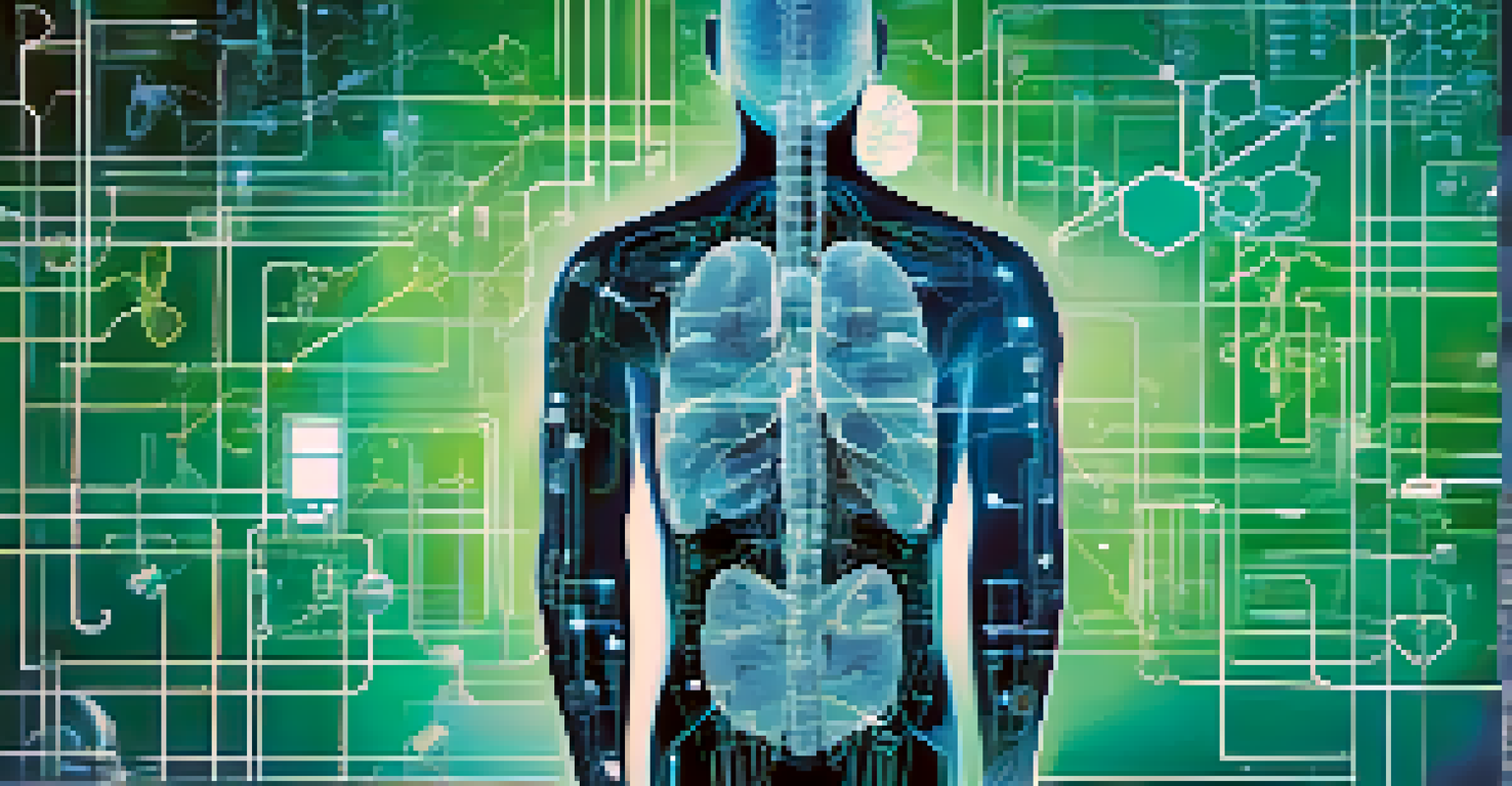AI and Predictive Analytics in Preventive Health Care

Understanding AI and Predictive Analytics in Health Care
Artificial Intelligence (AI) and predictive analytics are changing the landscape of health care, especially in preventive measures. AI refers to computer systems designed to mimic human intelligence, while predictive analytics uses data, statistical algorithms, and machine learning techniques to identify the likelihood of future outcomes. Together, they offer powerful tools to anticipate health issues before they arise, enhancing patient care and reducing costs.
The goal of AI is to enhance human capabilities, not replace them.
For instance, hospitals can analyze patient data to predict potential health crises, like heart attacks or diabetes flare-ups. This proactive approach not only saves lives but also alleviates pressure on emergency services. By identifying at-risk patients early, health care providers can tailor interventions that promote better health outcomes and improve the overall efficiency of health care delivery.
As we delve deeper into this topic, it becomes clear that integrating AI and predictive analytics into preventive health care is not just innovative; it’s essential. These technologies allow for personalized medicine, ensuring that each patient receives care tailored to their unique health profiles. This shift from reactive to proactive care could revolutionize how we think about health and wellness.
The Role of Data in Predictive Analytics
Data is the backbone of predictive analytics in health care. By collecting vast amounts of information from electronic health records (EHRs), wearable devices, and even social media, health care providers gain valuable insights into patient behaviors and risk factors. This data can reveal patterns that help predict health outcomes, making it a crucial element in preventive strategies.

For example, data from fitness trackers can inform health care providers about a patient’s activity levels, sleep patterns, and vital signs. By analyzing this information, practitioners can identify potential health risks early on and suggest lifestyle changes to mitigate them. This approach not only empowers patients but also fosters a collaborative relationship between patients and health care professionals.
AI Enhances Preventive Health Care
Artificial Intelligence and predictive analytics are revolutionizing preventive health care by enabling proactive measures that anticipate health issues.
Moreover, the more data we gather, the more accurate our predictions become. Machine learning algorithms continuously learn from new data, improving their predictive capabilities over time. This evolving technology ensures that preventive health care remains dynamic and responsive to changing health trends.
AI-Driven Risk Assessment Tools
Risk assessment tools powered by AI are invaluable in preventive health care. These tools analyze a patient’s historical and current health data to evaluate their risk for various diseases. By combining multiple data points, such as genetics, lifestyle choices, and environmental factors, these tools provide a comprehensive risk profile for each patient.
Without data, you're just another person with an opinion.
Consider a scenario where a patient is evaluated for their risk of developing cardiovascular diseases. An AI-driven tool might analyze factors like family history, cholesterol levels, and stress markers to calculate a personalized risk score. This information enables health care providers to recommend specific tests or lifestyle changes tailored to the patient's unique situation.
The implementation of AI-driven risk assessment tools signifies a significant shift towards more personalized health care. By understanding individual risks, health care providers can intervene earlier, leading to better health outcomes and a reduction in the overall burden on health care systems.
Predictive Analytics in Chronic Disease Management
Chronic diseases, such as diabetes and hypertension, require ongoing management and monitoring. Predictive analytics plays a critical role in this area by helping health care providers identify patients at risk of complications. By analyzing patient data over time, providers can intervene proactively to prevent adverse events.
For example, predictive analytics can highlight patterns indicating that a diabetic patient is likely to experience a spike in blood sugar levels. This early warning allows health care professionals to reach out and offer guidance on diet or medication adjustments before the problem escalates. It’s like having a safety net that catches potential health issues before they spiral out of control.
Data Powers Predictive Insights
The collection and analysis of diverse data sources enable health care providers to identify risk factors and improve patient outcomes.
Furthermore, by employing predictive analytics, health care systems can allocate resources more effectively, focusing efforts on patients who need the most support. This not only enhances patient care but also optimizes the use of health care resources, ensuring that everyone receives the attention they deserve.
Personalized Health Interventions Using AI
One of the most exciting applications of AI in preventive health care is the development of personalized health interventions. By leveraging data from various sources, AI can create tailored health plans that fit individual patients’ needs. These interventions may include customized exercise regimens, dietary recommendations, and medication plans.
Imagine a patient with hypertension receiving a personalized plan that factors in their lifestyle, preferences, and medical history. Instead of a one-size-fits-all approach, they get actionable steps designed specifically for them. This tailored methodology not only improves adherence to health recommendations but also enhances overall well-being.
Moreover, these personalized interventions can be continuously updated based on real-time health data. As patients progress, AI can adjust their health plans accordingly, ensuring they remain relevant and effective. This dynamic approach empowers patients to take control of their health journeys.
Challenges in Implementing AI and Predictive Analytics
Despite the promising potential of AI and predictive analytics, several challenges hinder their widespread implementation in preventive health care. One major issue is the integration of diverse data sources. Health care data is often siloed across various systems, making it difficult to create comprehensive profiles for patients.
Additionally, there are concerns about data privacy and security. Patients may be hesitant to share their health information due to fears of breaches or misuse. Health care providers must prioritize transparency and establish robust security measures to build trust with their patients.
Personalized Health Interventions
AI facilitates the creation of tailored health plans, empowering patients with customized interventions that fit their unique needs.
Finally, there’s the challenge of ensuring that health care professionals are adequately trained to use these advanced technologies. Continuous education and training are essential for practitioners to fully leverage AI and predictive analytics in their practice. Addressing these challenges is crucial for realizing the full benefits of these innovations.
The Future of Preventive Health Care with AI
Looking ahead, the future of preventive health care with AI and predictive analytics is bright. As technology continues to evolve, we can expect even more sophisticated tools that enhance our ability to predict and prevent health issues. Innovations like natural language processing and advanced machine learning will further refine data analysis and patient engagement strategies.
For example, we might soon see AI systems capable of analyzing genetic data alongside lifestyle and environmental factors to create even more accurate health predictions. This could lead to breakthroughs in understanding disease mechanisms and developing targeted preventive measures tailored to individual patients.

Ultimately, the integration of AI and predictive analytics into preventive health care promises to transform how we approach health and wellness. By emphasizing prevention over treatment, we can create a healthier, more proactive society where individuals take charge of their health destinies.